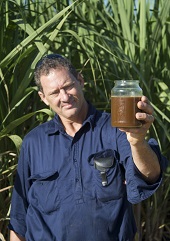Soil testing provides valuable information for farmers to enable them to fine-tune their nutrient application to meet the needs of their crops. With the reintroduction of on-ground compliance activities in the reef catchments, soil sampling methods have been updated.
Soil testing is required prior to planting to calculate the optimum amount of nitrogen and phosphorus to apply to crops, saving money and reducing the risk of surplus nutrients ending up in waterways.
As one of the key elements of Smartcane BMP, a growing number of Queensland cane farmers are seeing firsthand the benefits of soil testing and responding to soil issues based on scientific data. While soil analysis is only one management tool, the results can influence many decisions and practices which affect farm profitability and productivity.

is trialling bio-fertiliser in a
bid to reduce nitrogen run-off.
Faced with depleted soils, escalating fertiliser costs and increasing pressure to reduce nitrogen run-off into the Great Barrier Reef, Mario Raccanello has responded to the challenge by trialling bio-fertiliser on his 370 hectare farm near Tully.
Mario was one of more than 70 farmers who attended a Project Catalyst Forum in Cairns. He said being a part of a network of farmers who are involved in innovation and conducting many different trials was invaluable. Read more.
In recent years cropping regions across Australia have seen declining yields, putting the spotlight firmly on soil health. The message for farmers is it’s never too late to do something about the health of their soil. This has not been lost on sugarcane farmer John Attard who began seeking answers to his own declining yields on the land his father also farmed.
“In the early days, we were getting a good price for our sugar so we were doing a lot of crop maintenance, putting lime on, filter press and just looking after it,” John said. “When the sugar price collapsed, we stopped doing the maintenance and we found as soon as we stopped looking after the soil, our yields just started going down and down and down.”
Working with a consultant, making their own fertiliser, doing soil tests and utilising bio-fertiliser, John reports he's using half the fertiliser now for the same size crop, with an expected 10 per cent yield increase every year. Read more.

.jpg)